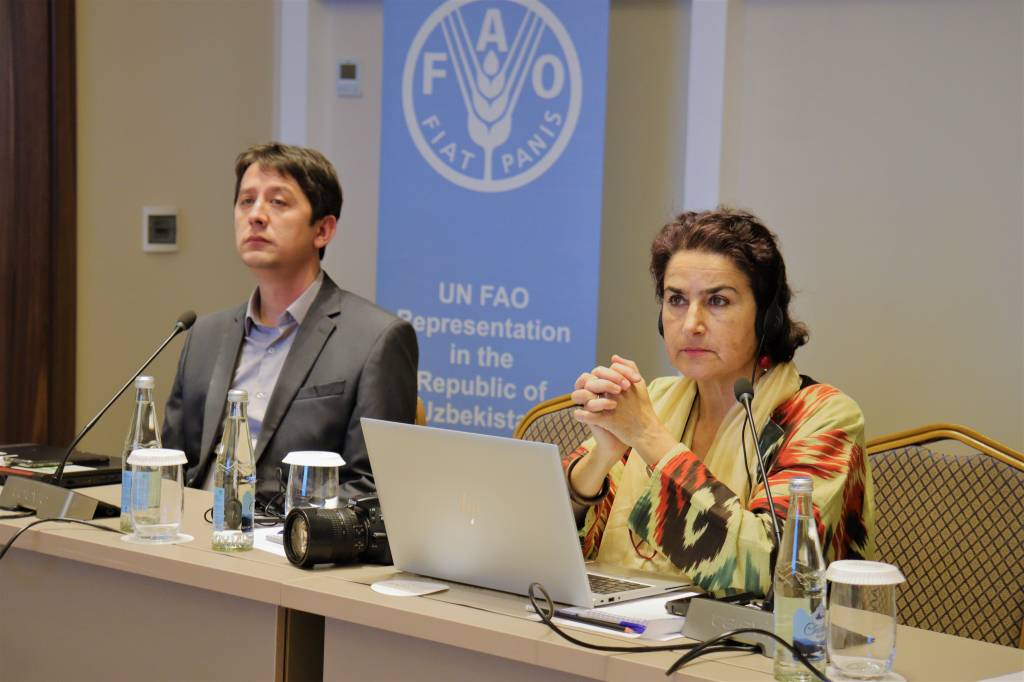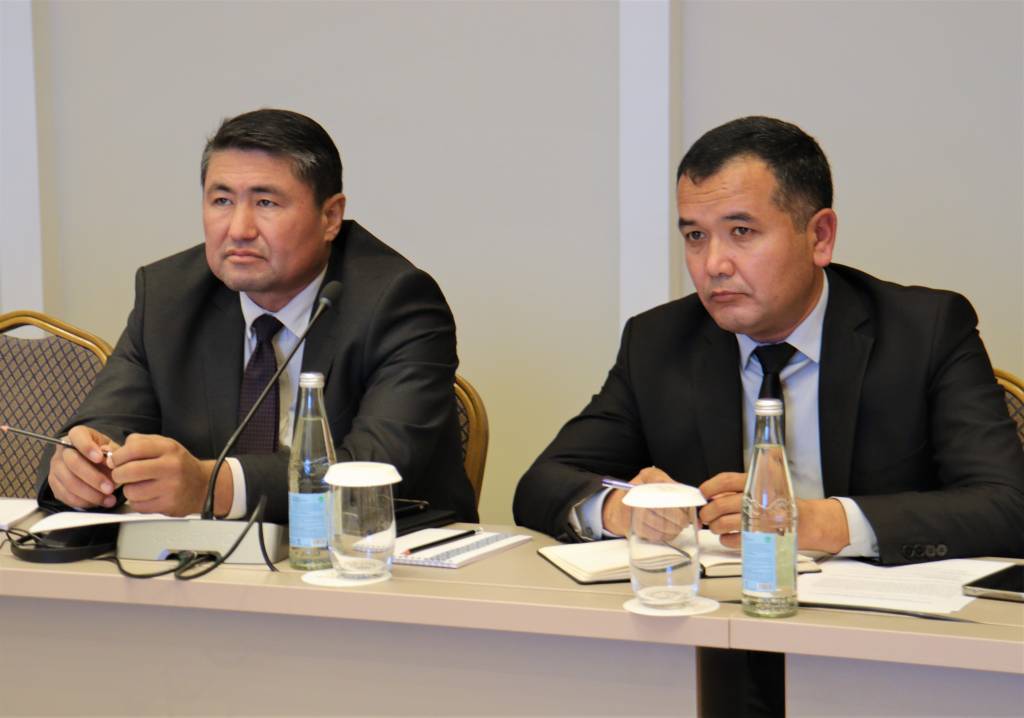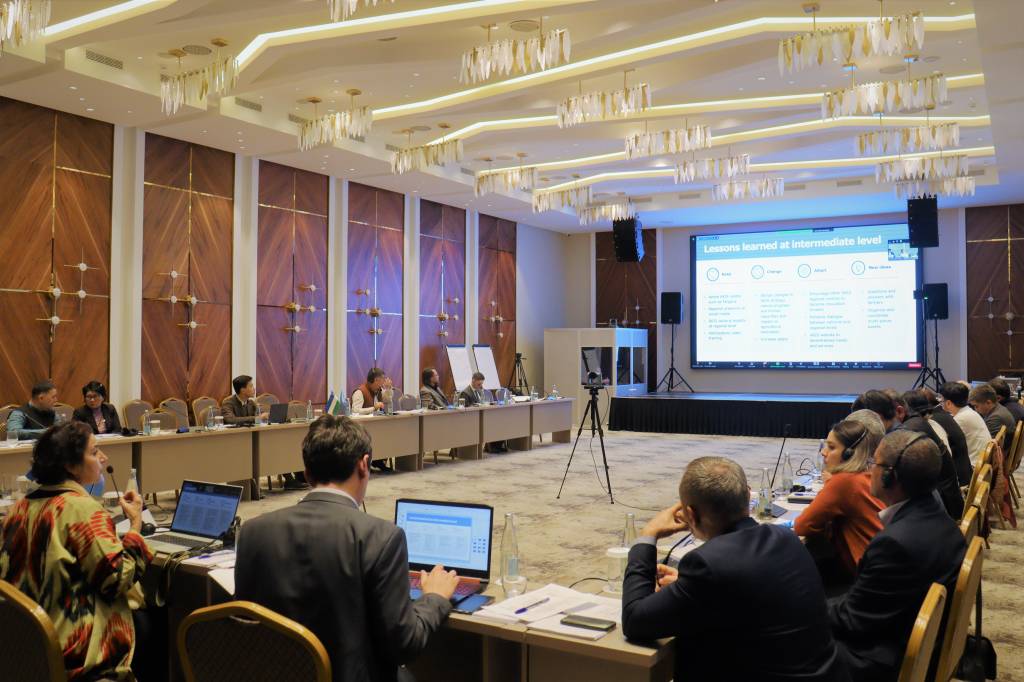
On 12 December 2023, the final workshop of the project “Preparing the grounds for the digital transformation of agriculture” brought together in Tashkent national and international stakeholders to present the lessons learned and recommendations related to agricultural innovation and digitalization.
The Food and Agriculture Organization of the United Nations (FAO) implemented this technical cooperation project in support of the Ministry of Agriculture of the Republic of Uzbekistan to address the challenges hindering innovation and digitalization in the agri-food sector. This initiative fostered cooperation and knowledge exchange among farmers, agribusiness entrepreneurs, research and agricultural advisory services at both national and decentralized levels in Fergana Valley. The FAO project outputs are aligned with the Presidential Decrees On approval of the Strategy “Digital Uzbekistan-2030” and measures for its effective implementation and “On further improvement of knowledge system and innovation and the provision of modern services in agriculture” signed respectively in 2020 and 2021.

“Through innovation and digitalization, this FAO project contributes to transforming more economically, environmentally sustainable, and inclusive agri-food systems. However, the technologies are not magic solutions. They should be accompanied by participatory approaches, awareness raising, and close support to smallholder men and women farmers”, Sherzod Umarov, FAO Assistant Representative in Uzbekistan noted.
The outcome of digitalization is the collaborative development of the National Digital Agriculture Programme. The draft strategic framework, designed with input from diverse stakeholders, was presented during the workshop. Participants engaged in constructive dialogue, providing valuable feedback and recommendations. Daniela Di Gianantonio, FAO Digital Agriculture Team Leader, said: “Uzbekistan has taken important steps towards digitalization of e-Government systems for agriculture, and this Programme serves as a strategic guide to transform its agrifood system into a modern, competitive, sustainable, and resilience sector”.
On the innovation side, the outcome is the operationalization of the Agricultural Knowledge and Innovation System (AKIS) – a network of actors that innovate forming a regional AKIS coordination group and innovation policy labs on key topics to identify and implement solutions at the strategic and organizational level in the region of Fergana and living labs – for co-creation in the field with farmers and experts. The innovation policy lab is a co-creative innovation approach that brings together different stakeholders to identify the cause, design actions, and implement them to resolve an issue hindering innovation in a particular context. “During the project implementation in Fergana the policy labs became a key modality for the operation of the established regional AKIS working group for Fergana valley, acting at the overall coordination level, and focusing on empowering women to participate in AKIS, as well as exploring the relationship and interdependence of the agricultural digitalization and AKIS in Fergana valley”, said Nevena Alexandrova-Stefanova, FAO Agricultural Extension Officer and Unit leader on Policy and capacity for Innovation. The experience of Innovation policy labs and living labs was a success. Next year, through a multi-donor-funded project, FAO will scale them up in Uzbekistan and other countries.

The project implementation facilitated the creation and scaling up innovations impacting agri-food systems. It contributed to developing new services, tools, and approaches to empower rural households and inspire entrepreneurship. Most importantly, the project involved in this process not only relevant institutions, but also rural communities, youth, women, and elders at the field level, leaving no one behind. Particular effort was made to reach and engage rural women who form a significant share (up to 44 percent) of the agricultural labour force but whose contribution often remains invisible and unrecognized. Specific living labs were organized for them to facilitate their access to knowledge and information sharing.
Sophie Treinen, FAO Communication for Development Officer and Coordinator of the project, noted that “Communication is key for development. As identified in the innovation and digitalization baseline assessments, Telegram is the most accessible App to farmers and the channel they use due to low connectivity in rural areas. Video is their favorite format for knowledge sharing. Therefore, we organized online training workshops on participatory video, on the one hand for future trainers and the other hand for practitioners. Members of the living labs and the regional AKIS group co-produced the videos you watched today. To have a long-lasting impact, both at regional and national levels, we prepared a participatory video guide in Uzbek and a platform for self-learning with the recording and presentations in Uzbek”.
She also underlined the importance of synergies between projects at regional complementing and reinforcing their impact. She acknowledged the experience gained on the ground from other projects in Fergana Valley like the Smart Farming Project for Future Generations, which is supporting the transition of smallholders toward modern and optimized agricultural production systems (efficient irrigation systems, optimized greenhouses, use of pollinators) with an approach that couple technology to continuous qualified proximity technical assistance. It is worth outlining how the accessibility of technical expertise is a vital catalyst for adopting innovative solutions.
Technical cooperation projects are planting the seeds for future project formulation and implementation based on the lessons learned. FAO will continue working on innovation and digitalization and seek further collaboration and synergies with other projects supporting the work of the Ministry of Agriculture.
UzA








